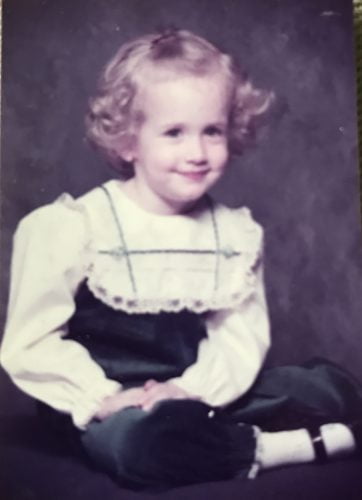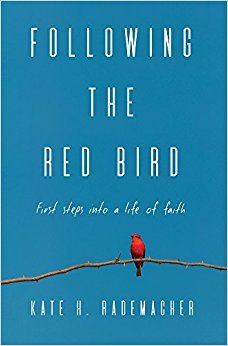 I am a cradle Christian.
I am a cradle Christian.
My name was on the Sunday School roll in the church nursery before I was born.
The stories of scriptures and words of the Bible have always been readily accessible to me when I was just a toddler (as seen in this picture).
I could recite the books of the Bible by the time I was 7 and could name the fruits of the spirit from the book of Galatians by age 9. The Christian school my parents sent me to in junior high challenged me to read the Bible through in the 7th grade (and I did!). I had a working knowledge of church history high school. I really don't know another way, for good or the bad.
But, the older I get, I realize, my story is an anomaly.
We don't teach our kids Bible stories, Bible facts or even stories of faith like I was taught in the height of Southern Baptist evangelicalism of the 1990s. As stiff structure surrounding the institutional church dies, fewer and fewer kids are growing up as I did including my own daughter.
Instead, the folks that fill the church pews of the congregations I'm most drawn to pastor aren't people who would call themselves cradle Christians. Or if they do, they'd say they are "recovering from it." I also hear a lot of "I'm a Christian but not that kind . . . "
Maybe cradle Christians are a dying bred?
If this is true, then how then do people arrive at faith, then, if not by osmosis from childhood? Isn't that how most people chose a religious tradition?
Recently, while I attended Wild Goose Festival in Hot Spring, NC I had the opportunity to meet a fellow author with a story that answers such a question. Kate Rademacher is a recent convert to Christianity is the author of a new memoir called, Following the Red Bird: First Steps into a Life of Faith.
In her book, she describes how after years of living in a social conscious, yet secular home and marrying a practicing Buddhist husband, she finds herself hearing the voice of God for the first time.
Though her childhood idea of the Trinity was "reduce, reuse and recycle" she found herself saying "Hello" (literally just like that) to God. The conversation took off from there (how amazing!). Within months, Kate found herself on a Christian path learning more about Jesus then seeking baptism in the Episcopal Church several years later.
Kate's prose was refreshingly honest and engaging. You never feel like Kate is telling you what you want to hear but what actually is her experience of God. Once I started reading Following the Red bird, I couldn't put it down. I finished it the next day.
 When I got to the last page, I felt grateful for the way that Kate calls out cradle Christians like me for our privilege (even if that was not the main focus of her story).
When I got to the last page, I felt grateful for the way that Kate calls out cradle Christians like me for our privilege (even if that was not the main focus of her story).
Seeing the world through Kate's lens, we, cradle Christians, have no idea how scary it is to walk into a study group with no working knowledge on the Bible.
We have no idea what it feels like to be drawn to a life of prayer without what to say.
We have no idea how discernment feels like without any spiritual tools to know if you're a helpful track or not.
So, as a pastor, I'm so thankful to have Kate's story as a resource for spiritual seekers who find their way to my inbox or office.
But even more than this, I'm grateful for how Following the Red Bird opened up my spiritual imagination.
We, as cradle Christians or even as professional ministers, can get so stressed out on God's behalf (or so we say).
We invest in lives, hoping for spiritual growth, but nothing changes. We preach our hearts out and it feels like no one is listening. We expect a particular trajectory for the spiritual formation of our children or grandchildren. And we feel sad when it doesn't happen.
I even saw that with the baptism of my daughter several months ago. Several well wishers remarked on social media that they wish she grows up to be a "God-fearing woman who takes to the teachings of the faith early." While I know it came from a loving place, my first reaction was "What pressure! Don't put that on her."
Here's the thing I believe about spiritual journeys (which Kate's story helped to me to see all over again): we can't control them.
The best conditions for spiritual instruction can't make a person find a personal conviction. Nor can lack of religious education keep a person from God when it's the right time for the journey to begin.
Openness is really the best gift we can give each other, especially to our children.
Isn't that what faith is about in the first place? Letting go and trusting in a power beyond what we can see?
I'm glad, as a cradle Christian, for the gift that Kate's faith story is to the world.
(Check out Kate's book on Amazon if you're looking for a faith memoir!)